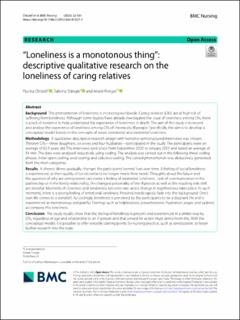Please use this identifier to cite or link to this item:
https://doi.org/10.21256/zhaw-27876Full metadata record
| DC Field | Value | Language |
|---|---|---|
| dc.contributor.author | Chistell, Flurina | - |
| dc.contributor.author | Stängle, Sabrina | - |
| dc.contributor.author | Fringer, André | - |
| dc.date.accessioned | 2023-05-25T14:20:09Z | - |
| dc.date.available | 2023-05-25T14:20:09Z | - |
| dc.date.issued | 2023-05-15 | - |
| dc.identifier.issn | 1472-6955 | de_CH |
| dc.identifier.uri | https://digitalcollection.zhaw.ch/handle/11475/27876 | - |
| dc.description.abstract | Background: The phenomenon of loneliness is increasing worldwide. Caring relatives (CRs) are at high risk of suffering from loneliness. Although some studies have already investigated the issue of loneliness among CRs, there is a lack of evidence to help understand the experience of loneliness in depth. The aim of this study is to record and analyse the experience of loneliness among CRs of chronically ill people. Specifically, the aim is to develop a conceptual model based on the concepts of social, emotional, and existential loneliness. Methodology: A qualitative-descriptive research design with narrative semistructured interviews was chosen. Thirteen CRs—three daughters, six wives and four husbands—participated in the study. The participants were an average of 62.5 years old. The interviews took place from September 2020 to January 2021 and lasted an average of 54 min. The data were analysed inductively using coding. The analysis was carried out in the following three coding phases: initial open coding, axial coding, and selective coding. The central phenomenon was abductively generated from the main categories. Results: A chronic illness gradually changes the participants’ normal lives over time. A feeling of social loneliness is experienced, as their quality of social contacts no longer meets their needs. Thoughts about the future and the question of why are omnipresent can create a feeling of existential loneliness. Lack of communication in the partnership or in the family relationship, the changed personality of the ill person as well as the resulting role shift are stressful. Moments of closeness and tenderness become rare, and a change in togetherness takes place. In such moments, there is a strong feeling of emotional loneliness. Personal needs rapidly fade into the background. One’s own life comes to a standstill. Accordingly, loneliness is perceived by the participants to be a stagnant life and is experienced as monotonous and painful. Feelings such as helplessness, powerlessness, frustration, anger, and sadness accompany this loneliness. Conclusion: The study results show that the feeling of loneliness is present and experienced in a similar way by CRs, regardless of age and relationship to an ill person and that a need for action must derive from this. With the conceptual model, it is possible to offer versatile starting points for nursing practice, such as sensitization, to foster further research into the topic. | de_CH |
| dc.language.iso | en | de_CH |
| dc.publisher | BioMed Central | de_CH |
| dc.relation.ispartof | BMC Nursing | de_CH |
| dc.rights | https://creativecommons.org/licenses/by/4.0/ | de_CH |
| dc.subject | Caring relative | de_CH |
| dc.subject | Chronic illness | de_CH |
| dc.subject | Experience | de_CH |
| dc.subject | Loneliness | de_CH |
| dc.subject | Qualitative interview | de_CH |
| dc.subject.ddc | 150: Psychologie | de_CH |
| dc.subject.ddc | 610.73: Pflege | de_CH |
| dc.title | "Loneliness is a monotonous thing" : descriptive qualitative research on the loneliness of caring relatives | de_CH |
| dc.type | Beitrag in wissenschaftlicher Zeitschrift | de_CH |
| dcterms.type | Text | de_CH |
| zhaw.departement | Gesundheit | de_CH |
| zhaw.organisationalunit | Institut für Pflege (IPF) | de_CH |
| dc.identifier.doi | 10.1186/s12912-023-01327-4 | de_CH |
| dc.identifier.doi | 10.21256/zhaw-27876 | - |
| dc.identifier.pmid | 37189144 | de_CH |
| zhaw.funding.eu | No | de_CH |
| zhaw.issue | 1 | de_CH |
| zhaw.originated.zhaw | Yes | de_CH |
| zhaw.pages.start | 161 | de_CH |
| zhaw.publication.status | publishedVersion | de_CH |
| zhaw.volume | 22 | de_CH |
| zhaw.publication.review | Open peer review | de_CH |
| zhaw.webfeed | G: Gesundheit im Alter | de_CH |
| zhaw.author.additional | No | de_CH |
| zhaw.display.portrait | Yes | de_CH |
| zhaw.monitoring.costperiod | 2023 | de_CH |
| Appears in collections: | Publikationen Gesundheit | |
Files in This Item:
| File | Description | Size | Format | |
|---|---|---|---|---|
| 2023_Chistell-etal_Loneliness-of-caring-relatives_BMCNursing.pdf | 1.17 MB | Adobe PDF |  View/Open |
Show simple item record
Chistell, F., Stängle, S., & Fringer, A. (2023). “Loneliness is a monotonous thing” : descriptive qualitative research on the loneliness of caring relatives. BMC Nursing, 22(1), 161. https://doi.org/10.1186/s12912-023-01327-4
Chistell, F., Stängle, S. and Fringer, A. (2023) ‘‘Loneliness is a monotonous thing’ : descriptive qualitative research on the loneliness of caring relatives’, BMC Nursing, 22(1), p. 161. Available at: https://doi.org/10.1186/s12912-023-01327-4.
F. Chistell, S. Stängle, and A. Fringer, ““Loneliness is a monotonous thing” : descriptive qualitative research on the loneliness of caring relatives,” BMC Nursing, vol. 22, no. 1, p. 161, May 2023, doi: 10.1186/s12912-023-01327-4.
CHISTELL, Flurina, Sabrina STÄNGLE und André FRINGER, 2023. „Loneliness is a monotonous thing“ : descriptive qualitative research on the loneliness of caring relatives. BMC Nursing. 15 Mai 2023. Bd. 22, Nr. 1, S. 161. DOI 10.1186/s12912-023-01327-4
Chistell, Flurina, Sabrina Stängle, and André Fringer. 2023. ““Loneliness Is a Monotonous Thing” : Descriptive Qualitative Research on the Loneliness of Caring Relatives.” BMC Nursing 22 (1): 161. https://doi.org/10.1186/s12912-023-01327-4.
Chistell, Flurina, et al. ““Loneliness Is a Monotonous Thing” : Descriptive Qualitative Research on the Loneliness of Caring Relatives.” BMC Nursing, vol. 22, no. 1, May 2023, p. 161, https://doi.org/10.1186/s12912-023-01327-4.
Items in DSpace are protected by copyright, with all rights reserved, unless otherwise indicated.